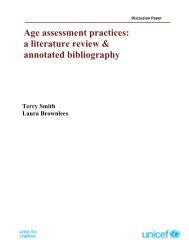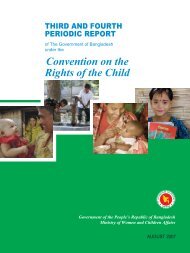Government-funded programmes and services for vulnerable - Unicef
Government-funded programmes and services for vulnerable - Unicef
Government-funded programmes and services for vulnerable - Unicef
Create successful ePaper yourself
Turn your PDF publications into a flip-book with our unique Google optimized e-Paper software.
Department of Basic Education<br />
●<br />
●<br />
●<br />
grief <strong>and</strong> trauma associated with illness <strong>and</strong> death of family/household members;<br />
increased domestic responsibility <strong>and</strong> risk of child labour <strong>for</strong> children facing both<br />
poverty <strong>and</strong> HIV/AIDS;<br />
HIV/AIDS-related stigma <strong>and</strong> discrimination.<br />
However, these policies are not being implemented properly because of insufficient policy<br />
coordination <strong>and</strong> lack of policy coherence, as well as insufficient communication <strong>and</strong><br />
training of the people responsible <strong>for</strong> developing school level implementation policies <strong>and</strong><br />
plans <strong>and</strong> those responsible <strong>for</strong> actual implementation. The school governing bodies are<br />
primarily tasked with developing operational <strong>and</strong> implementation plans at school level.<br />
There are too many policies <strong>and</strong> the school governing bodies, or those who know of the<br />
policies, do not know how they fit together or how they ought to be applied. They are<br />
not given sufficient guidance on how to navigate the complex web of policies or how to<br />
translate them into practical plans of action. The policy guidelines <strong>and</strong> manuals that have<br />
been produced do not provide concrete <strong>and</strong> practical advice on how to deal with, prevent<br />
<strong>and</strong> avoid the barriers in question, especially with regards to stigma <strong>and</strong> discrimination.<br />
The recommendations are often too vague (Giese & Koch 2008b).<br />
The process <strong>for</strong> the identification of learners affected by HIV/AIDS in ordinary public<br />
schools as learners with special needs (which would result in their being placed in special<br />
schools) is not sufficiently inclusive of affected parties. There is a lack of involvement of<br />
educators, parents <strong>and</strong> learners themselves in the assessment process <strong>for</strong> determining the<br />
special needs of learners. At present, the process is dominated by medical professionals.<br />
There are too many referrals of children with unique learning needs to special schools.<br />
Learners continue to be unnecessarily referred to special schools primarily because the<br />
mainstream schools do not have adequate resources to provide <strong>for</strong> the needs of children<br />
with additional/special needs. There must be improved investment in infrastructure <strong>and</strong> in<br />
professional <strong>and</strong> financial support <strong>for</strong> mainstream schools so that they can accommodate<br />
<strong>and</strong> meet the needs <strong>and</strong> rights of <strong>vulnerable</strong> children <strong>and</strong>/or children with special needs<br />
(Giese & Koch 2008b).<br />
More than 2 million learners enrolled in ordinary schools in 2007 were orphans who had<br />
lost either one or both parents; 460 000 learners had lost both parents. 83 There is a lack<br />
of appropriate referral options <strong>and</strong> insufficient training <strong>for</strong> educators on dealing with<br />
children affected by grief <strong>and</strong> trauma brought about by, inter alia, illness <strong>and</strong> death of<br />
family/household members. There are not enough appropriately qualified professional<br />
support staff at schools to provide support to the numbers of grief-stricken children living<br />
in households affected by HIV/AIDS that experience multiple bereavements, <strong>and</strong> to ensure<br />
that children are not further traumatised by inappropriate counselling/intervention (Giese<br />
& Koch 2008b).<br />
The response by the DoBE <strong>and</strong> schools to the increase in domestic responsibilities,<br />
especially <strong>for</strong> girls, brought on by HIV <strong>and</strong> poverty in the family is inadequate.<br />
A report by the World Bank (2002: ix) found that a ‘good basic education ranks amongst<br />
the most effective – <strong>and</strong> cost effective – means of HIV prevention’. The HIV & AIDS<br />
<strong>and</strong> STI National Strategic Plan 2007–2011 identifies girls <strong>and</strong> young women as being<br />
83 Annual School Survey, 2010<br />
171
















